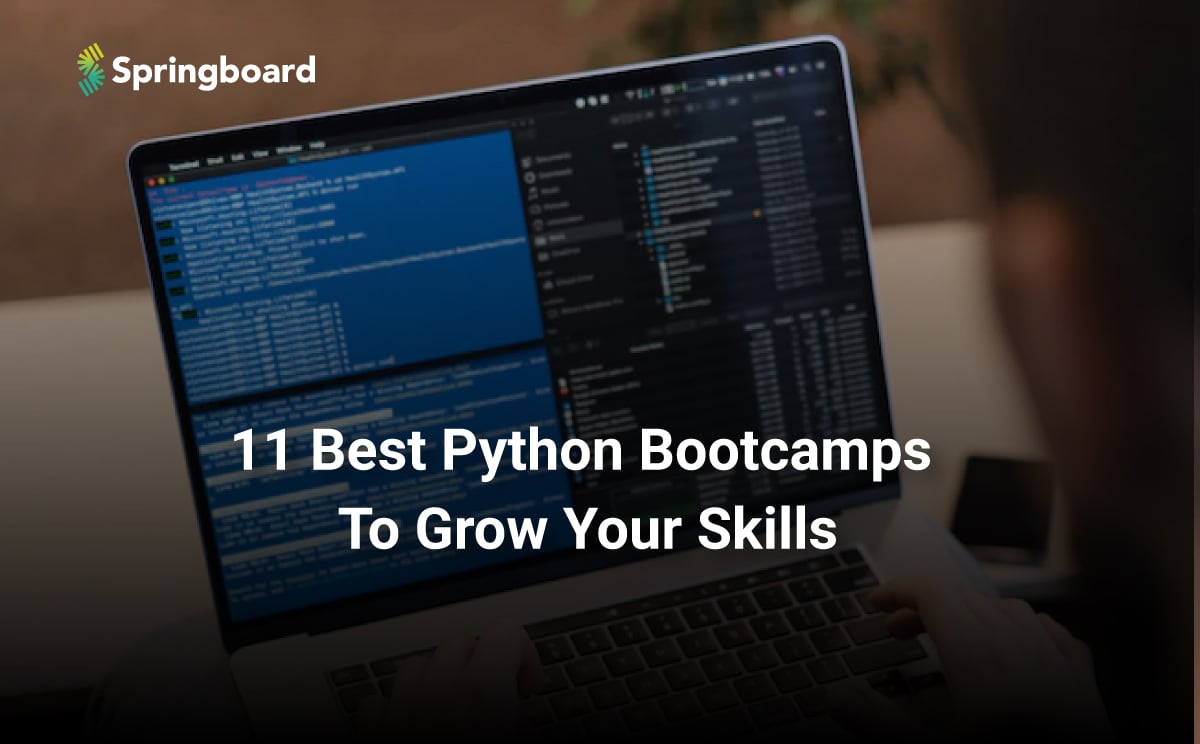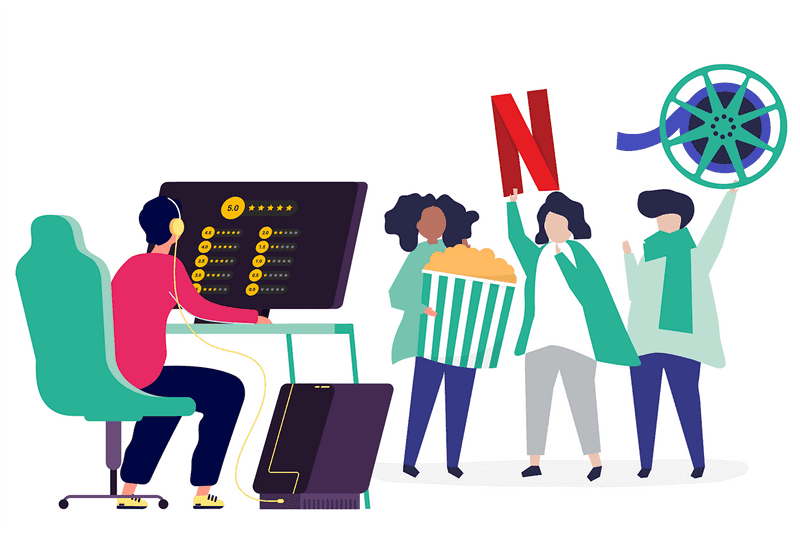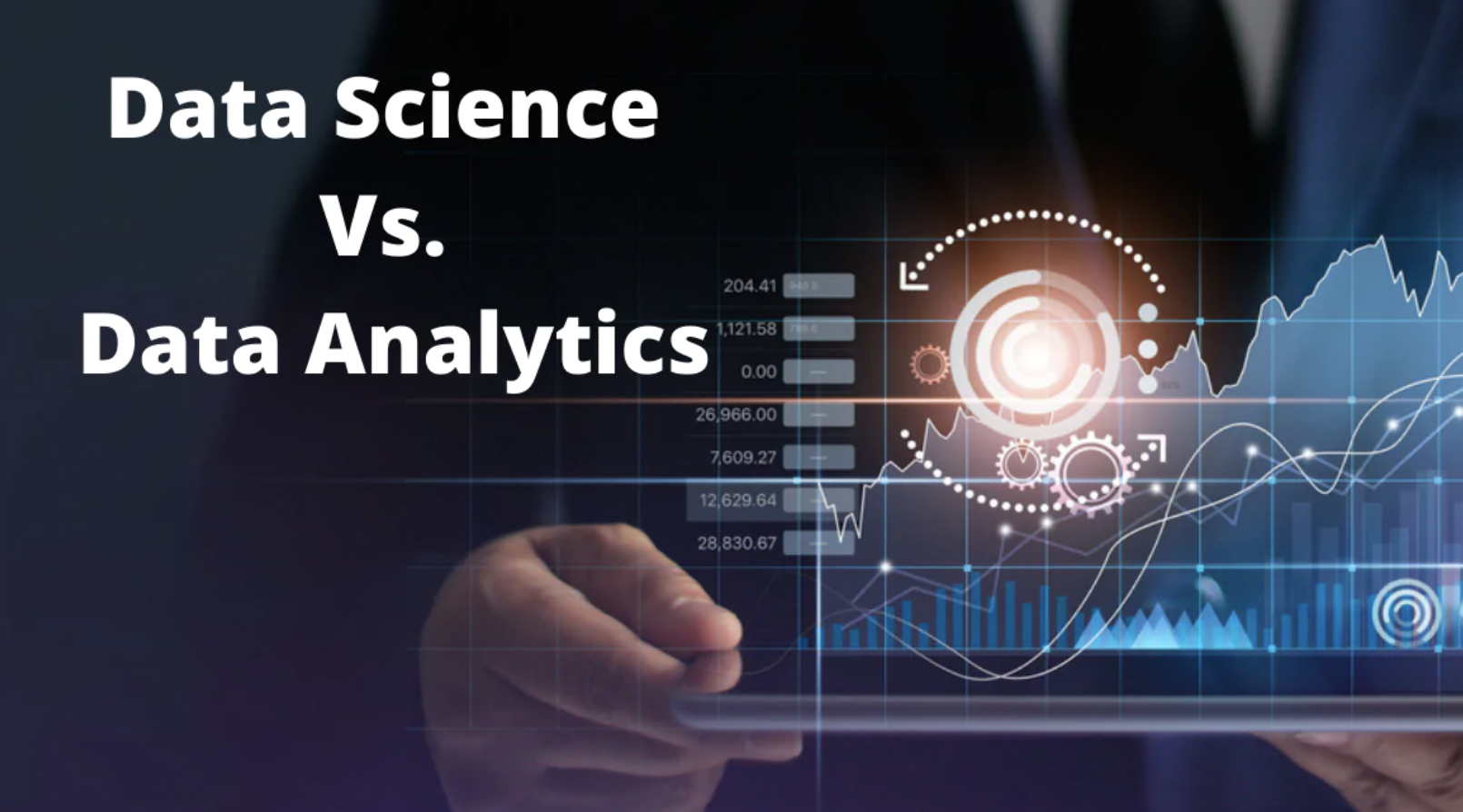Do you want to learn Python but don’t know where to start? Python is a great coding language for beginners, but it’s also a powerful tool for advanced applications like data science and machine learning.
Bootcamps are one of the most effective ways to learn Python, especially for those looking to get into data science. To find a bootcamp that meets your learning needs, read on for a comparison of the 11 best Python bootcamps.
What Is a Python Bootcamp?
Python bootcamps are training programs that help students master both Python fundamentals and advanced topics. Also known as coding bootcamps, these courses often cover other popular programming languages like SQL or R. Many bootcamps focus on specialized applications of Python in fields like data science or software engineering.
11 Best Python Bootcamps
| Company | Bootcamp | Rank | Price | Details |
|---|---|---|---|---|
 | Data Science Career Track | 4.64 | $11,340 | Learn More |
 | Data science Bootcamp | 4.2 | $25,000 | Learn More |
 | Python Programming | 4.36 | $3,950 | Learn More |
 | Complete Python Bootcamp | 4.6 | $139.99 | Learn More |
 | Software Engineering Coding Bootcamp with JavaScript and Python | 4.7 | $17,980 | Learn More |
 | Data Science Bootcamp | 4.64 | $17,600 | Learn More |
 | Remote Python 3 and React Course | 4.2 | $7,500 | Learn More |
 | The Complete Python Pro Bootcamp | 4.7 | $84.99 | Learn More |
 | Data Science Course | 4.6 | $16,900 | Learn More |
 | Data Science and Machine Learning Bootcamp | 4.6 | $84.99 | Learn More |
 | Python Bootcamp Online | 4.9 | $2499 | Learn More |
Here’s how the 11 best Python bootcamps compare by rating, price, curriculum, and more.
Data Science Career Track – Springboard

Rating
Overview
Springboard’s Data Science Career Track is designed to help students launch careers in data science. Students build applied data science and programming experience through hands-on projects as well as a unique capstone project. Key topics include:
- The Python data science stack
Students learn how to use Python and its standard libraries. Students build visualizations with Madplotlib and Seaborn and write elegant Python code using the PEP8 standard. - Machine learning
Students use scikit-learn, a Python library for machine learning (ML), to implement supervised and unsupervised machine learning algorithms. Students learn top ML techniques like linear and logistic regression, clustering, decision trees, and more. - Software engineering for data science
Students learn how to write better code, test and debug code, and work with production systems.
Best For
This course is best for career-focused learners who want a job guarantee. Springboard pairs each student with a personal industry-expert mentor. Through their mentors, students receive career advice as well as academic guidance throughout the program. Students also work one-on-one with a career counselor to facilitate their job search. Springboard also promises a full refund to bootcamp graduates who do not land a data science job after completing the course.
To enroll, students need six months of active coding experience with general-purpose programming languages and a basic understanding of probability and descriptive statistics.
Duration
Six months at 15-20 hours per week.
Location
Remote.
Price
$9,900 – $11,340.
Data Science Bootcamp – Byte Academy
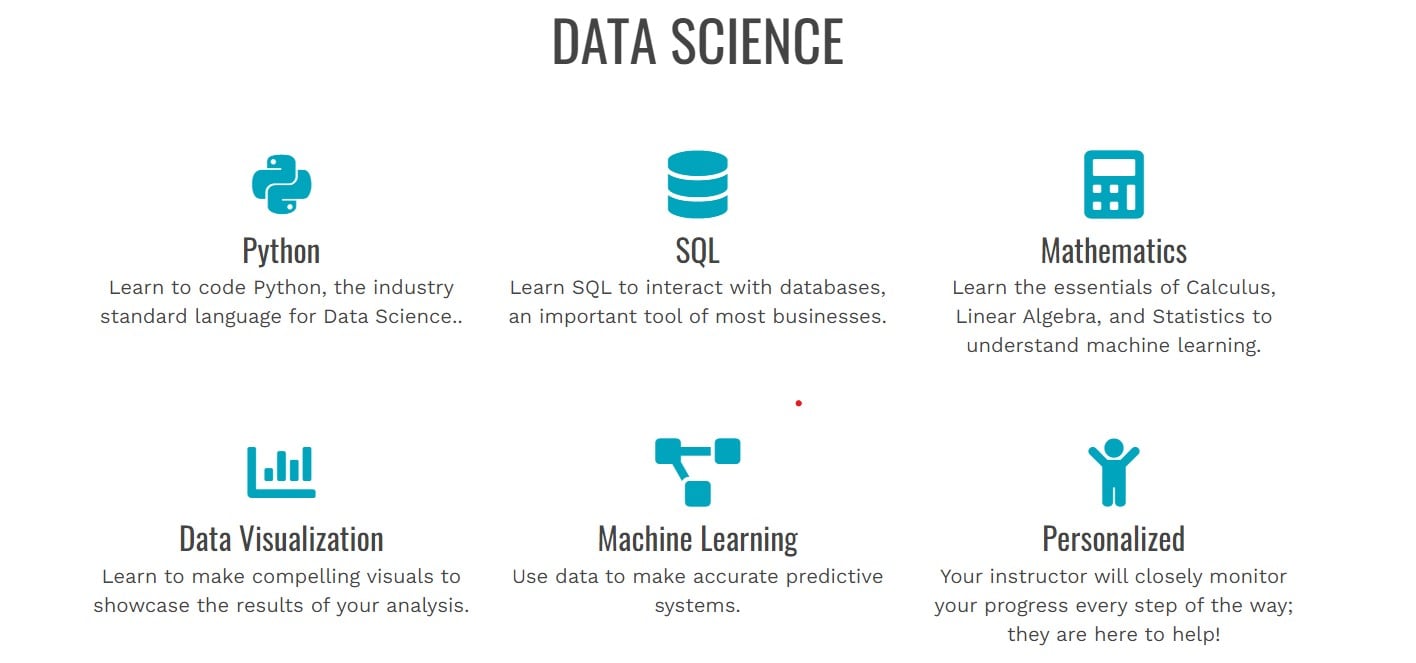
Rating
Overview
The following three topics form the core of Byte Academy’s Data Science Bootcamp:
- Python and SQL
Students learn how to use Python in a data science context. Students also learn how to use SQL to interact with databases. - Machine learning and mathematics
Students master a basic understanding of calculus, linear algebra, and statistics in the context of machine learning. Students also learn to use data to create accurate predictive systems. - Data visualization
Students learn to communicate the results of data analysis with compelling visuals.
Best For
This course is best for students who want an online coding bootcamp that includes an internship. Bootcamp students enrolled in the full-time program participate in a four-week mandatory internship with a real company.
Duration
24 weeks.
Location
Remote.
Price
$25,000.
Python Course – General Assembly
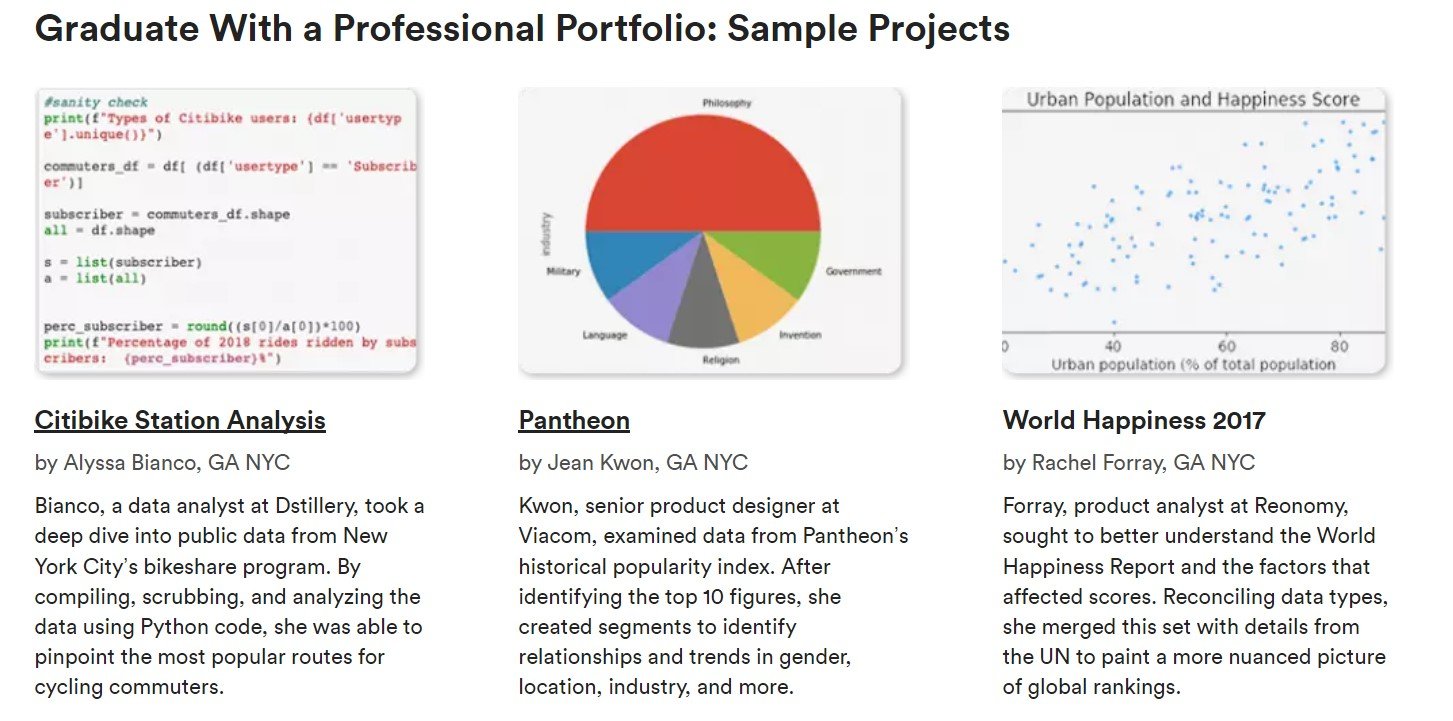
Rating
Overview
This program offers a deep dive into Python programming fundamentals. The curriculum emphasizes real-world programming skills through code-alongs and labs. Key topics include:
- Applications of Python
Students explore Python’s powerful applications in web development and data science. - Python programming concepts
Students build a solid understanding of Python’s vocabulary and collaborate with classmates on coding exercises. - Real-world portfolio projects
Students build an application from scratch. Depending on the focus of the cohort, students will either manipulate and visualize data with Pandas, or integrate APIs into a web app with Flask.
Get To Know Other Data Science Students
Jonathan Orr
Data Scientist at Carlisle & Company
Samuel Okoye
IT Consultant at Kforce
Mikiko Bazeley
ML Engineer at MailChimp
Best For
Complete beginners who want to develop basic programming knowledge.
Duration
10 weeks of evening learning or a condensed and accelerated one-week course.
Location
Remote or on-campus.
Price
$3,950.
2022 Complete Python Bootcamp From Zero to Hero in Python – Jose Portilla on Udemy

Rating
- Udemy: 4.6/5
Overview
Focusing exclusively on Python, this course teaches students how to build applications and games. The program covers Jupyter Notebook, .py files, and complex topics like decorators. Key topics include:
- Object-oriented programming
Students learn to structure programs by bundling related properties and behaviors into individual objects. - Methods and functions
Students learn how to use built-in and user-defined functions. - Modules and packages
Students install Pip and PyPi and learn how to use them.
Best For
Beginners without programming experience or programmers who are learning Python for the first time.
Duration
22 hours.
Location
Remote
Price
$16.58 per month, or $139.99 for full lifetime access.
Software Engineering Coding Bootcamp With JavaScript and Python – HackReactor
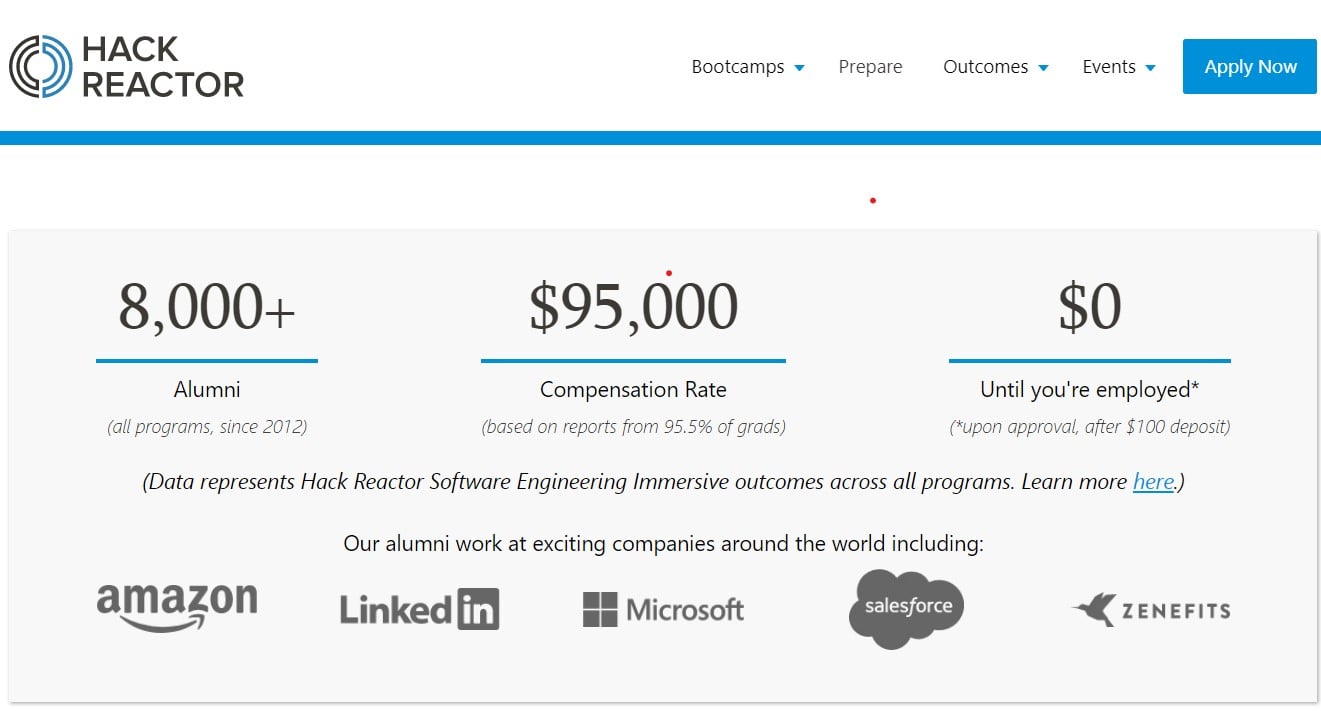
Rating
Overview
This program covers algorithms, data structures, networking, and databases. Students learn Python and JavaScript, as well as practices like microservices, CI/CD, and network security. Key topics include:
- Full-stack architecture
Students learn how to build and run interactive web applications with HTML, CSS, Python, and Django. - Distributed applications
Students take a deep dive into building complex web apps. - Data-intensive applications
Students learn to manage large amounts of data and practice development-security operations (DevSecOps) to handle cloud-based operations.
Best For
Students who have an open schedule and want an intensive program. Unlike most online bootcamps, this program follows a schedule that Hack Reactor calls “Nine 9s.” Students participate in live classes for nine consecutive days, nine hours per day, with no class on the 10th day. Classes are held from 9 a.m. to 7 p.m.
Duration
19 weeks at 40 – 60 hours per week.
Location
Remote.
Price
$17,980
Data Science Bootcamp – NYC Data Science Academy
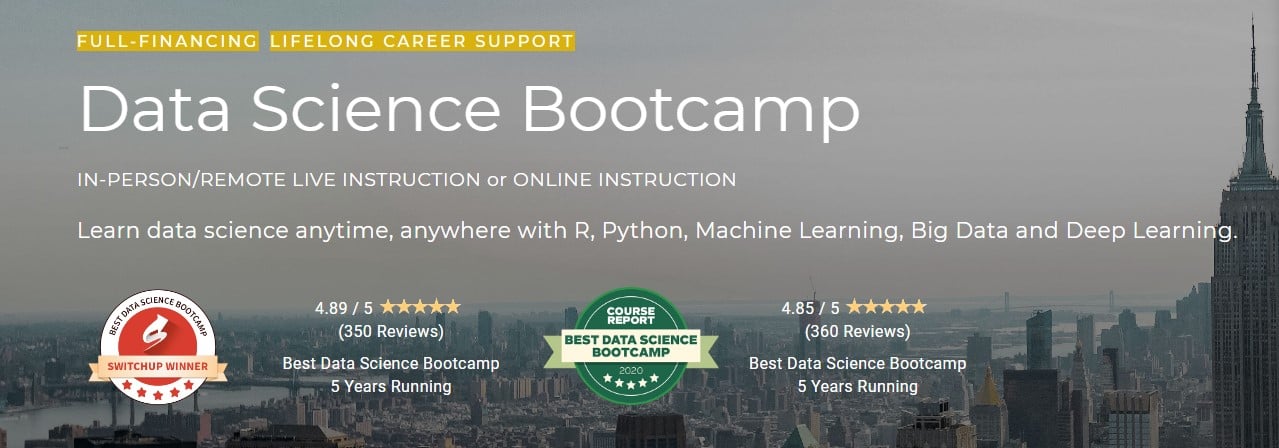
Rating
Overview
NYC Data Science Academy is another career-focused bootcamp provider. The program is designed to help students land jobs and offers both part-time and full-time instruction options. Key topics include:
- Python and R
Students learn how to implement these programming languages in the context of data analytics. Students also practice using Python and R to communicate the results of their analysis. - Machine learning
Students practice machine learning with Python and execute research projects that incorporate advanced data science methodologies. - Deep learning and big data
Students learn about scalability, deep learning models, big data technologies, and cloud computing.
Best For
Choose this course if you’re looking for live instruction. Live classes are offered in-person or remotely via Zoom, although those who prefer to create their own schedules are able to choose an interactive distance learning structure that does not include live instruction.
Applicants should have a master’s degree or Ph.D. in science, technology, engineering, or math. Bachelor’s degrees in these fields—as well as non-STEM subjects—will also be considered.
Duration
12-24 weeks at 20-40 hours per week.
Location
Remote or in-person in New York City.
Price
$17,600.
Remote Python 3 and React Course – Bottega
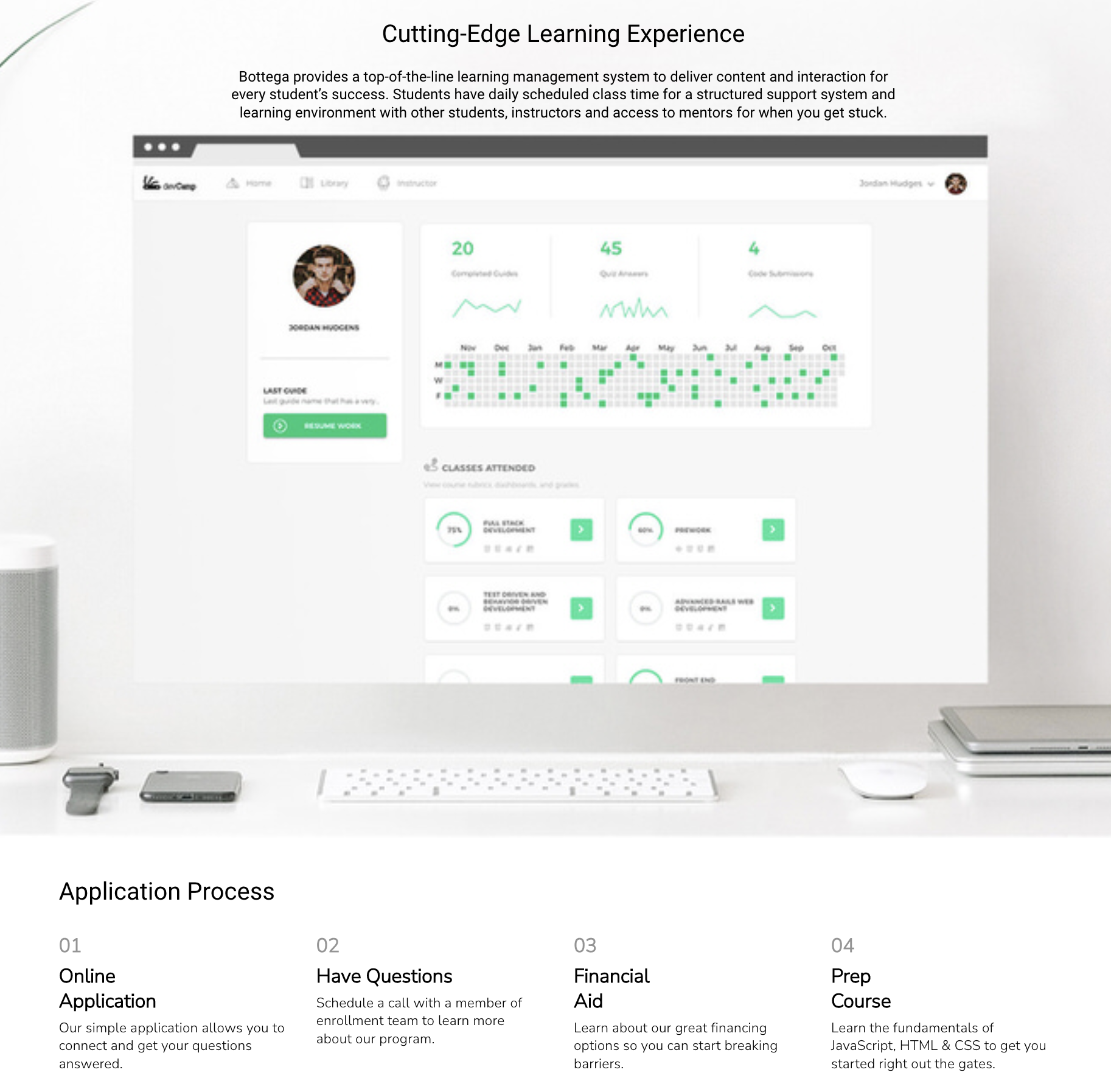
Rating
Overview
Bottega’s program offers a highly structured support system, including a daily schedule class time in which students interface with classmates and instructors in a live learning environment. Key topics include:
- Programming in Python
Students practice programming through interactive exercises focused on key concepts like functions, classes, objects, and more. - Python software development
Students explore advanced Python features like scripting, modules, packages, and more. - Front-end foundations
Students learn about the design and development of browser-based programs with JavaScript.
Best For
The aspiring software developer. This course focuses on the programming tools that software engineers use every day.
Duration
40 weeks. The bootcamp includes 50 hours of pre-work and 600 hours of curriculum. Students can choose between live classes and asynchronous, self-paced learning.
Location
Remote.
Price
$7,500.
100 Days of Code: The Complete Python Pro Bootcamp for 2022 – Dr. Angela Yu on Udemy

Rating
- Udemy: 4.7/5
Overview
This program promises to help students master Python through 100 projects over the course of 100 days. Over the course of the program, students learn game, app, and web development, data science, and machine learning. Key topics include:
- Python programming fundamentals
Students complete interactive coding exercises to explore variables, debugging, data types, and other Python basics. - Web development
Students learn HTML and CSS for front-end development. Students practice web scraping with Beautiful Soup. - Data visualization
Students practice data exploration, cleaning, and visualization with real-world data.
Best For
This course is best for students on a budget. While this course doesn’t offer career services or mentorship, it is a highly affordable online coding bootcamp.
Duration
The course can be completed at your own pace. The curriculum includes 60 hours of on-demand video, 128 downloadable resources, and 230 articles.
Location
Remote.
Price
$16.68 per month or $84.99 for full lifetime access.
Data Science Bootcamp – Flatiron School
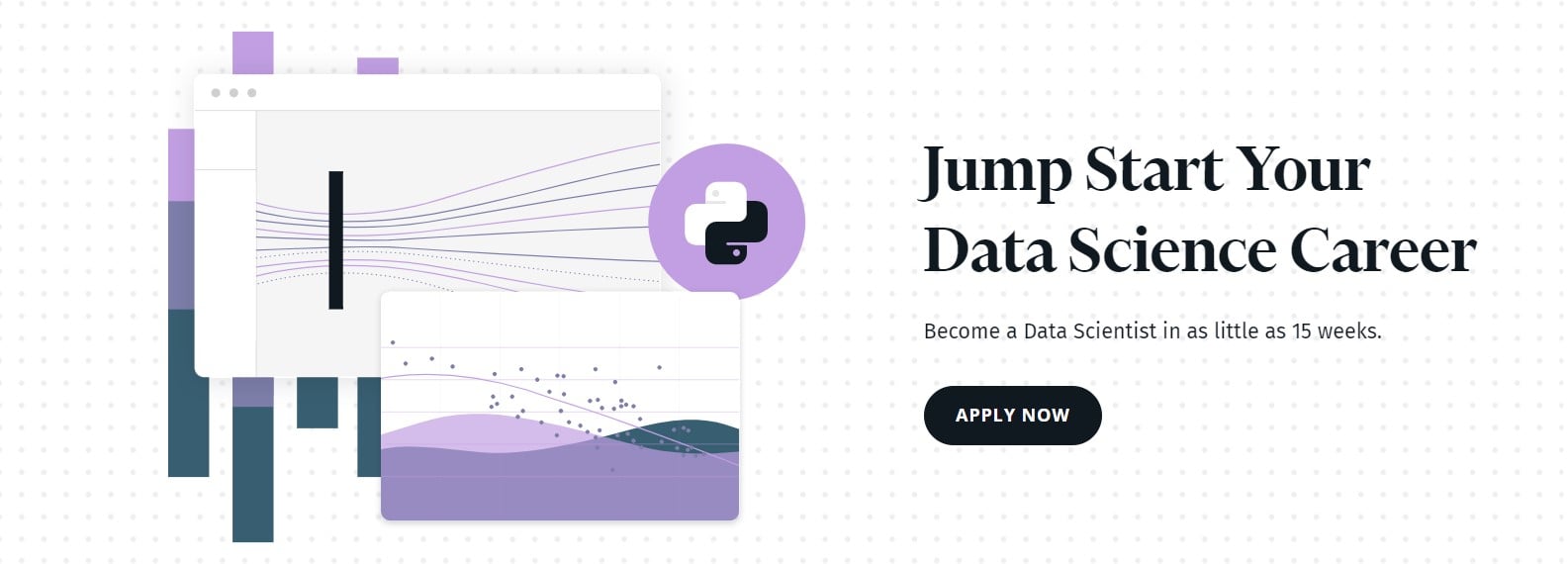
Rating
Overview
These three topics form the core of the Flatiron School’s Data Science Bootcamp:
- Data analysis and engineering
Students learn how to extract and visualize insights from data using Python and SQL. - Scientific computing
Students use scientific computing tools in Python—including NumPy, Pandas, and SciPy—to create data reports. - Machine learning
Students explore foundational machine learning models like linear and logistic regression before building advanced models with complex algorithms.
Best For
Total beginners. Flatiron courses are designed to accommodate learners without prior STEM experience.
Duration
Most students take 15 weeks, at eight hours a day and five days a week, to finish the course. However, there are some other flexible scheduling options.
Location
Remote or in-person in New York City.
Price
$16,900.
Python for Data Science and Machine Learning Bootcamp – Jose Portilla on Udemy

Rating
- Udemy: 4.6/5
Overview
This course teaches students how to use Python to analyze data, build effective data visualizations, and run powerful machine learning algorithms. Key topics include:
- Data visualization
Students learn to use Madplotlib, Seaborn, and plotly to create data visualizations. - Machine learning
Students explore machine learning with sci-kit learn, including topics like linear regression, K means clustering, natural language processing, and more. - NumPy and Pandas
Students learn to use NumPy—a key Python library—and Pandas (a high-level data manipulation tool) to solve complex tasks.
Best For
This course is designed for beginners with some programming experience or experienced software developers eager to transition into data science.
Duration
Self-paced. The course includes 25 hours of on-demand video, five downloadable resources, and 13 articles.
Location
Remote.
Price
$16.58 per month or 84.99 for lifetime access.
Learn Python Online (Python Bootcamp) – Coding Nomads

Rating
Overview
This course teaches students to build applications from scratch using Python, SQL, and APIs. The course trains students to think like developers while building technical skills with popular programming languages. Key topics include:
- Critical programming tools
Students learn how to use GitHub, the command line interface, Visual Studio Code IDE, and virtual coding environments. - Python Programming
Students use Python to learn back-end engineering and build automation software. - Python APIs
Students learn how to integrate Python applications with RESTful APIs to leverage millions of datasets.
Best For
This course is best for students who want to start slow before intensifying their learning experience. Coding Nomad students can start with self-paced learning at a low price point and then switch to more expensive mentor-led learning in order to master complex concepts.
Duration
Self-paced, or three months at 10-20 hours per week for the three-month intensive version of the program.
Location
Remote.
Price
Variable. $9 per month buys access to course content and a members-only forum, while $899 per month buys access to an intensive, mentor-led program. The flat rate for a three-month intensive program is $2499.
How Do You Choose a Python Bootcamp?
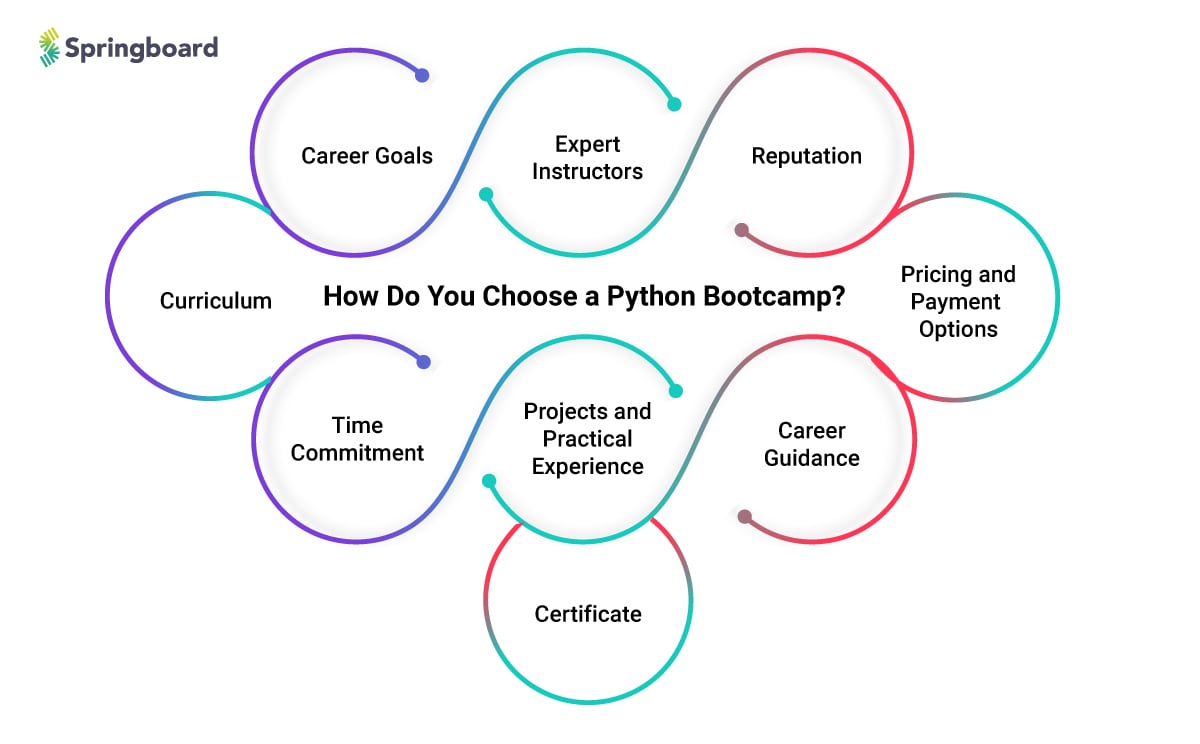
Wondering which bootcamp program is right for you? Consider these factors when making your decision.
Curriculum
Consider whether the course materials align with your learning goals. If you’re exploring computer science for the first time and looking to build foundational programming skills before moving on to more advanced topics, focus your attention on bootcamps that are exclusively dedicated to coding.
If you’re looking to learn how to apply programming skills to data science or software development, focus on longer, more-in depth courses that cater to those specializations.
Career Goals
If you want to pivot into the tech industry, narrow down your list of programs to career-focused courses. Python programming skills can prepare you for a variety of roles in machine learning and software development.
If you’re interested in artificial intelligence, focus on a data science specialization. If building apps, games, and websites are your goal, focus on a software engineering specialization. Regardless of the path you choose, you’ll need a combination of technical skills and soft skills, so choose a course that will help you practice communicating your results.
Expert Instructors
Mentor-led programs are often pricier, but guidance from an industry-expert mentor will deliver robust returns. If your budget allows, prioritize programs that connect students with industry veterans who can offer career advice as well as answers to technical questions about the curriculum.
Reputation
When evaluating a bootcamp’s rating, consider the number of reviews used to generate that rating. A high number of reviews will generate a more accurate rating. If you have specific learning needs, search reviews for keywords related to your needs. If your goal is to launch a career, look for data reporting the percentage of students who landed a job after graduation.
Pricing and Payment Options
If you’re on a budget, keep an eye out for programs that offer income share agreements, deferred tuition plans, upfront discounts, month-to-month payment plans, or financing through loans. If your plan is to find a job after graduation, prioritize programs offering job guarantees that promise a full refund if you’re not able to find employment after finishing the program.
Time Commitment
Bootcamp length is a key consideration when choosing the program that’s right for you. Are you able to commit to a six-month program, or do you need a shorter course? Take a look at your day-to-day schedule and evaluate your free time. Can you commit 10-20 hours a week to a program, or do you need something more flexible and self-paced?
Projects and Practical Experience
If you’re looking to land a job, you’ll need to build a data science portfolio that conveys applied Python programming skills to hiring managers. A strong portfolio will include three to four projects specific to your specialization. Focus on courses that center project-based learning and include capstone projects designed to help you launch a career in tech.
Career Guidance
If your goal is to launch a new career, prioritize courses that offer career services. Programs like Springboard’s Data Science Career Track will help you create a successful job search strategy through one-on-one calls with your career coach. You’ll also get access to mock interviews, a professional data science network, and assistance with building your resume and LinkedIn profile.
Certificate
A verified certificate of completion can help validate your skills when applying for jobs. Shareable certificates can be added to your LinkedIn profile and help draw recruiters to your page.
Making the Most Out of Your Python Bootcamp
Read on to find out how to make the most of your Python bootcamp.
How Do Python Bootcamps Work?
Python bootcamps begin with the basics of programming and gradually work up to more advanced topics. Most Python bootcamps are online programs that offer flexible schedules, though in-person instruction and remote live classes are available. Students learn to code—and eventually master more complex applications of Python—through videos, interactive exercises, articles, and projects.
What Should You Expect To Learn During a Python Bootcamp?
At minimum, an effective Python bootcamp will cover the following topics:
- Python fundamentals. Students should learn how to code with Python and use its standard libraries.
- Data visualization. Students should learn how to visualize data with tools like Madplotlib or similar.
- Python libraries. Students should learn how to use Python libraries that are relevant to their specialization.
What Will Your Schedule Look Like?
Your schedule will depend on the type of course you select. A remote, flexible course can be adapted to your existing schedule, while a live remote or in-person course will likely require you to alter your daily routine. Self-paced courses can be completed at your discretion, meaning you can step away whenever you desire and return to the class later.
FAQs About Python Bootcamps
Read on for answers to frequently asked questions about Python bootcamps.
Are Python Bootcamps Worth It?
Python bootcamps are effective tools for building Python programming skills. If you enroll in a career-focused course, you’ll walk away with the skills you need to land a job at the end of the program.
Are There Any Prerequisites for a Python Bootcamp?
Some Python bootcamps do carry prerequisites. Courses with math or coding requirements are often more in-depth and focus on preparing students for a job in data science or machine learning. Courses that focus on basic skills are open to complete beginners.
How Much Does a Python Bootcamp Cost?
Bootcamp prices range from $9 per month to $25,000 in total. The one you choose will depend on your schedule, your learning needs, career goals, and budget. Many bootcamps offer payment plans or other financing options.
Do Companies Hire Bootcamp Grads?
Yes! In fact, 92.5% of Springboard grads report receiving a job offer within 12 months of graduation. Enrolling in a qualified bootcamp program can be the fastest way to launch a career in tech!
Companies are no longer just collecting data. They’re seeking to use it to outpace competitors, especially with the rise of AI and advanced analytics techniques. Between organizations and these techniques are the data scientists – the experts who crunch numbers and translate them into actionable strategies. The future, it seems, belongs to those who can decipher the story hidden within the data, making the role of data scientists more important than ever.
In this article, we’ll look at 13 careers in data science, analyzing the roles and responsibilities and how to land that specific job in the best way. Whether you’re more drawn out to the creative side or interested in the strategy planning part of data architecture, there’s a niche for you.
Is Data Science A Good Career?
Yes. Besides being a field that comes with competitive salaries, the demand for data scientists continues to increase as they have an enormous impact on their organizations. It’s an interdisciplinary field that keeps the work varied and interesting.
10 Data Science Careers To Consider
Whether you want to change careers or land your first job in the field, here are 13 of the most lucrative data science careers to consider.
Data Scientist
Data scientists represent the foundation of the data science department. At the core of their role is the ability to analyze and interpret complex digital data, such as usage statistics, sales figures, logistics, or market research – all depending on the field they operate in.
They combine their computer science, statistics, and mathematics expertise to process and model data, then interpret the outcomes to create actionable plans for companies.
General Requirements
A data scientist’s career starts with a solid mathematical foundation, whether it’s interpreting the results of an A/B test or optimizing a marketing campaign. Data scientists should have programming expertise (primarily in Python and R) and strong data manipulation skills.
Although a university degree is not always required beyond their on-the-job experience, data scientists need a bunch of data science courses and certifications that demonstrate their expertise and willingness to learn.
Average Salary
The average salary of a data scientist in the US is $156,363 per year.
Data Analyst
A data analyst explores the nitty-gritty of data to uncover patterns, trends, and insights that are not always immediately apparent. They collect, process, and perform statistical analysis on large datasets and translate numbers and data to inform business decisions.
A typical day in their life can involve using tools like Excel or SQL and more advanced reporting tools like Power BI or Tableau to create dashboards and reports or visualize data for stakeholders. With that in mind, they have a unique skill set that allows them to act as a bridge between an organization’s technical and business sides.
General Requirements
To become a data analyst, you should have basic programming skills and proficiency in several data analysis tools. A lot of data analysts turn to specialized courses or data science bootcamps to acquire these skills.
For example, Coursera offers courses like Google’s Data Analytics Professional Certificate or IBM’s Data Analyst Professional Certificate, which are well-regarded in the industry. A bachelor’s degree in fields like computer science, statistics, or economics is standard, but many data analysts also come from diverse backgrounds like business, finance, or even social sciences.
Average Salary
The average base salary of a data analyst is $76,892 per year.
Business Analyst
Business analysts often have an essential role in an organization, driving change and improvement. That’s because their main role is to understand business challenges and needs and translate them into solutions through data analysis, process improvement, or resource allocation.
A typical day as a business analyst involves conducting market analysis, assessing business processes, or developing strategies to address areas of improvement. They use a variety of tools and methodologies, like SWOT analysis, to evaluate business models and their integration with technology.
General Requirements
Business analysts often have related degrees, such as BAs in Business Administration, Computer Science, or IT. Some roles might require or favor a master’s degree, especially in more complex industries or corporate environments.
Employers also value a business analyst’s knowledge of project management principles like Agile or Scrum and the ability to think critically and make well-informed decisions.
Average Salary
A business analyst can earn an average of $84,435 per year.
Database Administrator
The role of a database administrator is multifaceted. Their responsibilities include managing an organization’s database servers and application tools.
A DBA manages, backs up, and secures the data, making sure the database is available to all the necessary users and is performing correctly. They are also responsible for setting up user accounts and regulating access to the database. DBAs need to stay updated with the latest trends in database management and seek ways to improve database performance and capacity. As such, they collaborate closely with IT and database programmers.
General Requirements
Becoming a database administrator typically requires a solid educational foundation, such as a BA degree in data science-related fields. Nonetheless, it’s not all about the degree because real-world skills matter a lot. Aspiring database administrators should learn database languages, with SQL being the key player. They should also get their hands dirty with popular database systems like Oracle and Microsoft SQL Server.
Average Salary
Database administrators earn an average salary of $77,391 annually.
Data Engineer
Successful data engineers construct and maintain the infrastructure that allows the data to flow seamlessly. Besides understanding data ecosystems on the day-to-day, they build and oversee the pipelines that gather data from various sources so as to make data more accessible for those who need to analyze it (e.g., data analysts).
General Requirements
Data engineering is a role that demands not just technical expertise in tools like SQL, Python, and Hadoop but also a creative problem-solving approach to tackle the complex challenges of managing massive amounts of data efficiently.
Usually, employers look for credentials like university degrees or advanced data science courses and bootcamps.
Average Salary
Data engineers earn a whooping average salary of $125,180 per year.
Database Architect
A database architect’s main responsibility involves designing the entire blueprint of a data management system, much like an architect who sketches the plan for a building. They lay down the groundwork for an efficient and scalable data infrastructure.
Their day-to-day work is a fascinating mix of big-picture thinking and intricate detail management. They decide how to store, consume, integrate, and manage data by different business systems.
General Requirements
If you’re aiming to excel as a database architect but don’t necessarily want to pursue a degree, you could start honing your technical skills. Become proficient in database systems like MySQL or Oracle, and learn data modeling tools like ERwin. Don’t forget programming languages – SQL, Python, or Java.
If you want to take it one step further, pursue a credential like the Certified Data Management Professional (CDMP) or the Data Science Bootcamp by Springboard.
Average Salary
Data architecture is a very lucrative career. A database architect can earn an average of $165,383 per year.
Machine Learning Engineer
A machine learning engineer experiments with various machine learning models and algorithms, fine-tuning them for specific tasks like image recognition, natural language processing, or predictive analytics. Machine learning engineers also collaborate closely with data scientists and analysts to understand the requirements and limitations of data and translate these insights into solutions.
General Requirements
As a rule of thumb, machine learning engineers must be proficient in programming languages like Python or Java, and be familiar with machine learning frameworks like TensorFlow or PyTorch. To successfully pursue this career, you can either choose to undergo a degree or enroll in courses and follow a self-study approach.
Average Salary
Depending heavily on the company’s size, machine learning engineers can earn between $125K and $187K per year, one of the highest-paying AI careers.
Quantitative Analyst
Qualitative analysts are essential for financial institutions, where they apply mathematical and statistical methods to analyze financial markets and assess risks. They are the brains behind complex models that predict market trends, evaluate investment strategies, and assist in making informed financial decisions.
They often deal with derivatives pricing, algorithmic trading, and risk management strategies, requiring a deep understanding of both finance and mathematics.
General Requirements
This data science role demands strong analytical skills, proficiency in mathematics and statistics, and a good grasp of financial theory. It always helps if you come from a finance-related background.
Average Salary
A quantitative analyst earns an average of $173,307 per year.
Data Mining Specialist
A data mining specialist uses their statistics and machine learning expertise to reveal patterns and insights that can solve problems. They swift through huge amounts of data, applying algorithms and data mining techniques to identify correlations and anomalies. In addition to these, data mining specialists are also essential for organizations to predict future trends and behaviors.
General Requirements
If you want to land a career in data mining, you should possess a degree or have a solid background in computer science, statistics, or a related field.
Average Salary
Data mining specialists earn $109,023 per year.
Data Visualisation Engineer
Data visualisation engineers specialize in transforming data into visually appealing graphical representations, much like a data storyteller. A big part of their day involves working with data analysts and business teams to understand the data’s context.
General Requirements
Data visualization engineers need a strong foundation in data analysis and be proficient in programming languages often used in data visualization, such as JavaScript, Python, or R. A valuable addition to their already-existing experience is a bit of expertise in design principles to allow them to create visualizations.
Average Salary
The average annual pay of a data visualization engineer is $103,031.
Resources To Find Data Science Jobs
The key to finding a good data science job is knowing where to look without procrastinating. To make sure you leverage the right platforms, read on.
Job Boards
When hunting for data science jobs, both niche job boards and general ones can be treasure troves of opportunity.
Niche boards are created specifically for data science and related fields, offering listings that cut through the noise of broader job markets. Meanwhile, general job boards can have hidden gems and opportunities.
Online Communities
Spend time on platforms like Slack, Discord, GitHub, or IndieHackers, as they are a space to share knowledge, collaborate on projects, and find job openings posted by community members.
Network And LinkedIn
Don’t forget about socials like LinkedIn or Twitter. The LinkedIn Jobs section, in particular, is a useful resource, offering a wide range of opportunities and the ability to directly reach out to hiring managers or apply for positions. Just make sure not to apply through the “Easy Apply” options, as you’ll be competing with thousands of applicants who bring nothing unique to the table.
FAQs about Data Science Careers
We answer your most frequently asked questions.
Do I Need A Degree For Data Science?
A degree is not a set-in-stone requirement to become a data scientist. It’s true many data scientists hold a BA’s or MA’s degree, but these just provide foundational knowledge. It’s up to you to pursue further education through courses or bootcamps or work on projects that enhance your expertise. What matters most is your ability to demonstrate proficiency in data science concepts and tools.
Does Data Science Need Coding?
Yes. Coding is essential for data manipulation and analysis, especially knowledge of programming languages like Python and R.
Is Data Science A Lot Of Math?
It depends on the career you want to pursue. Data science involves quite a lot of math, particularly in areas like statistics, probability, and linear algebra.
What Skills Do You Need To Land an Entry-Level Data Science Position?
To land an entry-level job in data science, you should be proficient in several areas. As mentioned above, knowledge of programming languages is essential, and you should also have a good understanding of statistical analysis and machine learning. Soft skills are equally valuable, so make sure you’re acing problem-solving, critical thinking, and effective communication.
Since you’re here…Are you interested in this career track? Investigate with our free guide to what a data professional actually does. When you’re ready to build a CV that will make hiring managers melt, join our Data Science Bootcamp which will help you land a job or your tuition back!
